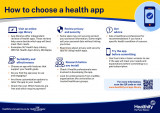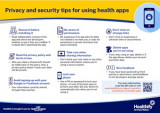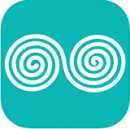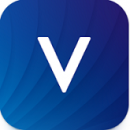Vertigo apps
Key points about vertigo apps
- Always use vertigo apps under the supervision of a healthcare provider so they can guide you on whether the app is suitable for your needs.
- Vertigo apps can provide information on exercises to help with your vertigo.
- You can use a vertigo app to keep track of your symptoms as part of your management plan.

Vertigo apps may have the following features:
- Information and education: Once you have some knowledge about vertigo, and after discussing which exercises are suitable for you with your healthcare provider, apps can provide information about what to expect and can help you manage your condition better.
- Instructions on how to perform exercises: A few different exercises may help relieve vertigo, depending on the cause of your vertigo. Typically, these exercises are considered either vestibular rehabilitation therapy or part of a canalith repositioning procedure.
- Symptom tracking: Tracking and monitoring your symptoms can be helpful to share with your healthcare provider. It can also help you establish what makes your symptoms worse (what your triggers are) and things that help ease your symptoms.
How to use vertigo apps safely
Do (✔)
- Always use vertigo apps under the supervision of a healthcare provider so they can guide you on whether the app is suitable for your needs and direct you to which exercises are appropriate for your particular type of vertigo.
- Use an app to keep track of your symptoms as part of your management plan. Use graphs and reporting as part of a discussion with your healthcare provider.
- If you experience an episode of vertigo, it can be very helpful for your specialist team to see a recording of your eye movements; therefore, recording your eye movements on your phone during a vertigo attack can be useful for your vestibular therapist or professional.
- Be aware that some exercises or manoeuvres shown in apps can cause dizziness and vertigo, so supervision is advised.
- Be careful when reading information on discussion boards or group chat rooms, where users can share their experiences. In most cases these aren't monitored by a health professional so the advice or suggestions may not be safe or effective practice.
- Know when to seek help.
Don’t (✘)
- Don't rely on apps to make a diagnosis of your condition.
- Don't perform exercises or manoeuvres without first seeking medical and professional diagnosis and instruction on which exercises in which app to use.
- Don't make changes to your medicines based on the recommendations from the app.
Always use vertigo apps under the supervision of a healthcare provider so they can guide you on whether the app is suitable for your needs and direct you to which exercises are appropriate for your particular type of vertigo.
Before choosing an app, think about how it will benefit you and what you want it to be able to do.
- An app will only be helpful if you use it, so it needs to be something you like using and find easy to use.
- If you find the app difficult to use, or you don't like the imagery or look of it, or the language it uses, you may want to find another one that suits you better.
- For more guidance on how to choose health apps, see how to choose a health app.
- It's important to remember that apps don’t replace professional help or your doctor’s advice.
| App | Features | Clinical score |
|---|---|---|
|
|
|
|
|
|
|
|
|
Disclaimer: The NZ Health App Library is a free consumer service to help you decide whether a health app would be suitable for you. Our review process is independent. We have no relationship with the app developers or companies and no responsibility for the service they provide. This means that if you have an issue with one of the apps we have reviewed, you will need to contact the app developer or company directly. |
Factsheets – using health apps safely

How to choose a health app
Healthify He Puna Waiora, NZ

Privacy and security tips for using health apps
Healthify He Puna Waiora, NZ
Credits: Healthify editorial team. Healthify is brought to you by Health Navigator Charitable Trust.




